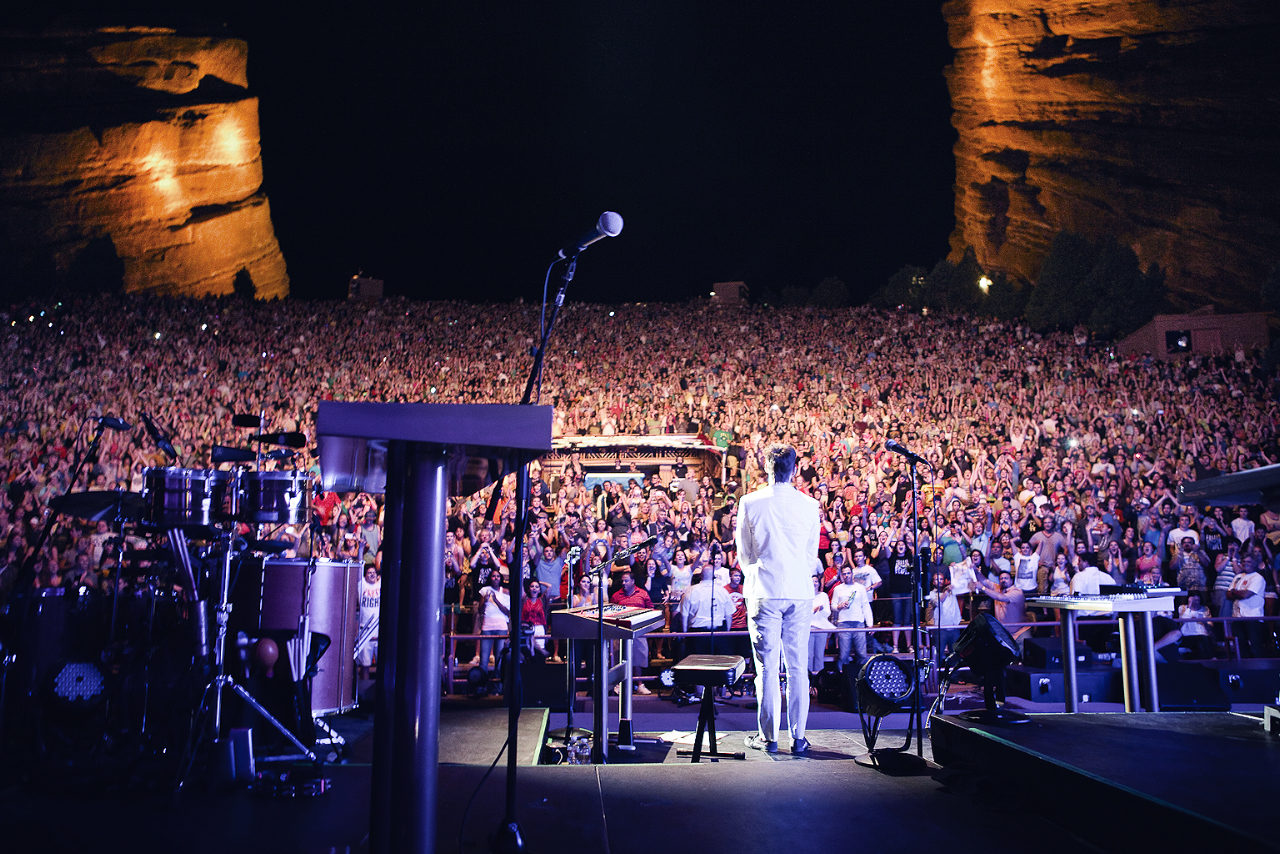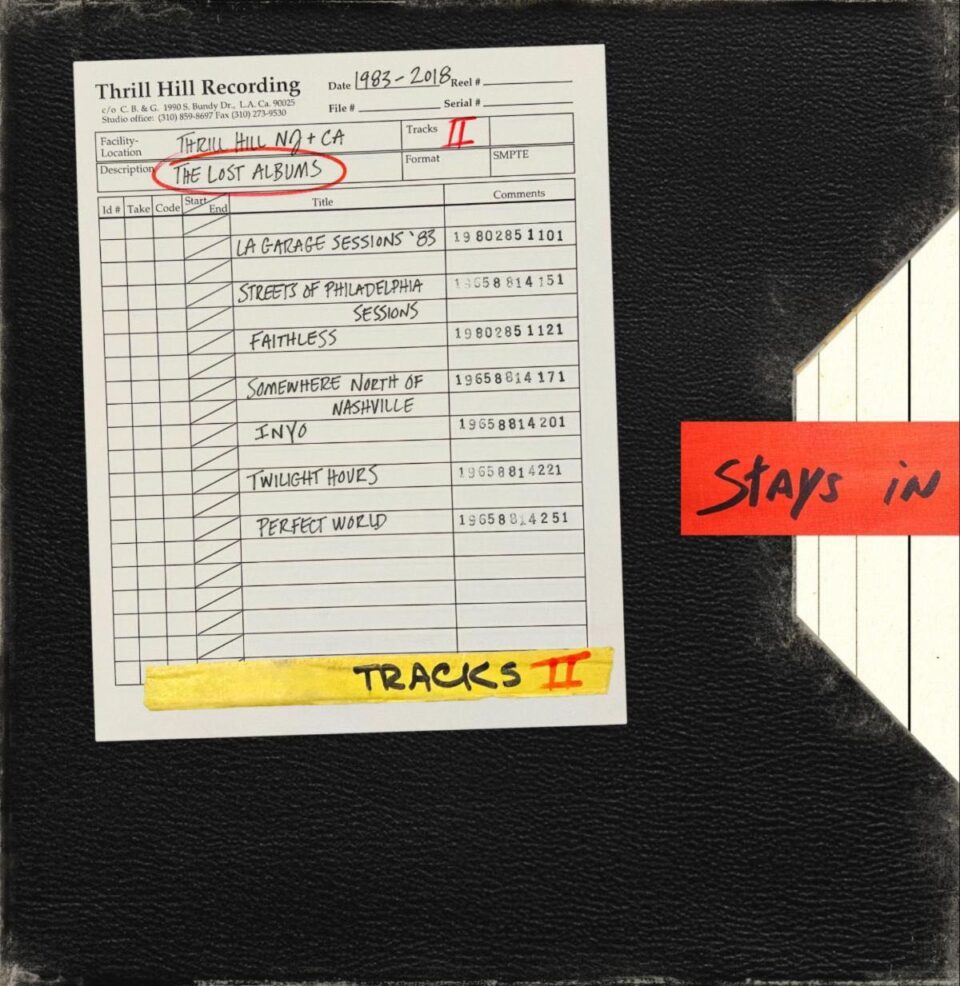Mark Foster was restless. In 2009, the Cleveland, Ohio transplant had been grinding in Los Angeles for nearly eight years, trying to make it as a songwriter. Some of those years had been more promising than others. “I moved to LA when I was 18, two months after I graduated from high school, and my first impression was that it’s a city of green lights,” Foster tells me over Zoom, reflecting on the early days of his pre–Foster the People career. “Within two years I had already beaten my body up pretty bad, and knew if I was ever going to accomplish any modicum of success that I’d have to get clean, find my soul again, and start working—just obsessively writing songs. That’s what I did. It was really hard. I slept in my car, I slept on couches.”
But it wasn’t all terrible. “I remember once every year there would be an opportunity that would come up and it would put wind in my sails,” he continues. “It was like chasing mirages in a desert, but the mirages kept me going. I guess they gave me hope that there was going to be water somewhere if I just kept looking.” Which brings us to 2009, the year when Foster’s self-doubts almost consumed him. In his own words, it was “one of the darkest years of my life.” Why? “I just had all these thoughts like, ‘This isn’t gonna happen, you don’t have a backup plan, you never went to college, you don’t really know how to do anything else and you’re going to waste your entire youth chasing a dream that is never going to happen.'”
At this point, Foster’s tiring of what he calls “that starving artist grind.” He spends his days composing commercial tunes for a company called Mophonics. He’s not saving money to hire a producer (he taught himself to produce)—rather, he’s saving money to move as far from LA as possible. “I had this dream like, I wanna be in the desert in Turkey, I don’t want to know anybody, I don’t want to even speak the language, I want to be left alone and actually experience something outside of this concrete rat race that I’d been living in and find myself,” he tells me. “That was my plan.”
“It was like chasing mirages in a desert, but the mirages kept me going. I guess they gave me hope that there was going to be water somewhere if I just kept looking.”
Meanwhile, Foster is outgrowing his own solo project. “There was a period of time when Jon Brion had a residency at Largo and he would go up and play every instrument and loop it and it was very compelling,” says Foster. “I tried that for a brief stint and it didn’t really translate, so I got to the point where I knew that if I wanted to play my songs live and actually do them justice, I would need to put together a band.”
The band materialized before the Turkey plan. Soon, Foster the People—rounded out by drummer Mark Pontius and bassist Cubbie Fink—started gigging around Los Angeles, then around Southern California, eventually landing a slot at SXSW in 2010. Pontius once called that set the worst show they’d ever played, but a year later, back at SXSW, they drew a bigger crowd—a crowd that was eager to sing along to “Pumped Up Kicks,” Foster the People’s breakout earworm which had gone viral in spectacularly 2010 fashion. “Even before SXSW, we had a show in LA I think two weeks after we put that song up and it started to go viral on Hype Machine and little music blogs started to pick it up,” recalls Foster. “We had a show at the Viper Room and it was packed. At that moment in time, even 200 people showing up at a show felt like a huge success.”
You probably know the larger arc of this story: a little-known indie group blows up with a breezy, radio-friendly bop about a school shooter, signs to a major label, releases an entire album of festival-ready dance-pop, then earns a pair of Grammy nominations for both the single and the record. In the process, a band that had only been booking small clubs for a few months is thrust into the national spotlight. Was Foster surprised by the demands of it all? “Surprised, no. That’s what I was waiting for. Humbled and grateful? Yeah. I think it was more of a relief.”
“I’m recognizing it now for the first time as a body of work that I’m actually critically proud of as an adult. In my head, for a number of years, I judged it as being an adolescent work.”
Despite the early critical and commercial success, Foster’s own feelings about Torches—which turned 10 in May—are complicated. “I just started relistening to Torches for the first time since we put it out, and I’m recognizing it now for the first time as a body of work that I’m actually critically proud of as an adult. In my head, for a number of years, I judged it as being an adolescent work. I mean, the spirit of it has that youthful, searching feeling all over it. But I found parts of it really profound in how it articulates the feeling of struggle, and how that record is a reflection of my inner thoughts at the time. I was so broken. And it breaks my heart to listen to it, actually, because I hear the small child inside of all of those songs that keeps saying, ‘The sun will shine again, you’re gonna be happy one day, it’s gonna be OK.'”
Foster packages that desperation in crisp pop arrangements that practically mandate dancing. He traces “a melodic and lyrical subtext of hope” straight from Torches through 2014’s Supermodel and 2017’s Sacred Hearts Club, but that quality is especially potent in Torches. “It’s tangible,” says Foster. “It’s optimism in the face of real struggle.”
Tomorrow the band will release a deluxe edition of the record called Torches X, featuring collected remixes and bonus tracks, plus Gus Dapperton’s glossy take on “Pumped Up Kicks.” Foster considers the bonus tracks B-sides, and part of him still wishes “Broken Jaw” made the original cut. (His label and team pushed back on including it, he says, “and maybe they were right.”) Now Foster is prepping for a string of shows at The Wiltern in LA, the last of which will be streamed via Moment House. He’s also eager to share a long-shelved collaboration with Taylor Swift, which will appear on her version of Red, due later this month. “We wrote that song together maybe nine years ago,” he says. “I’m really happy that it’s going to see the light of day.”
Pontius, meanwhile, recently announced that he’s pulling back from the band, so I ask Foster if he ever feels a similar urge to settle down. “I do feel that pull, for sure,” he concedes, but he can’t imagine not making music. “I’ll keep making music until I don’t feel like it anymore, and even then I might keep making music because maybe it’s my duty.” The pandemic, he explains, has changed how he views his role as an artist. “It’s also reminded me how powerful art is for people when we’re suffering. It’s a beautiful form of altruism.” FL









